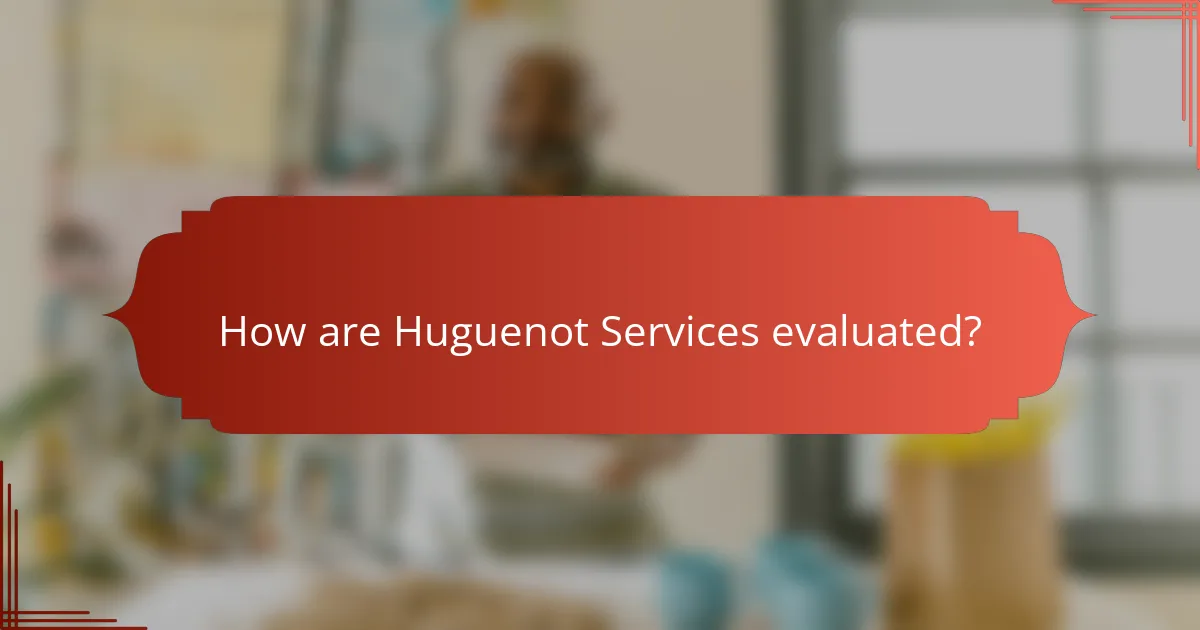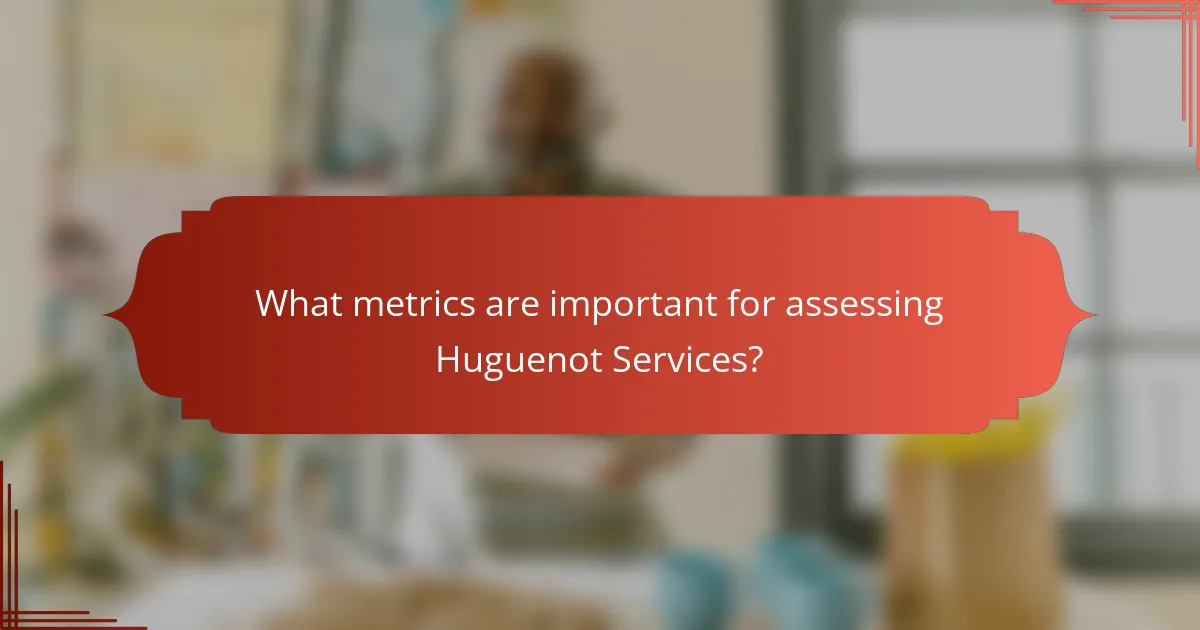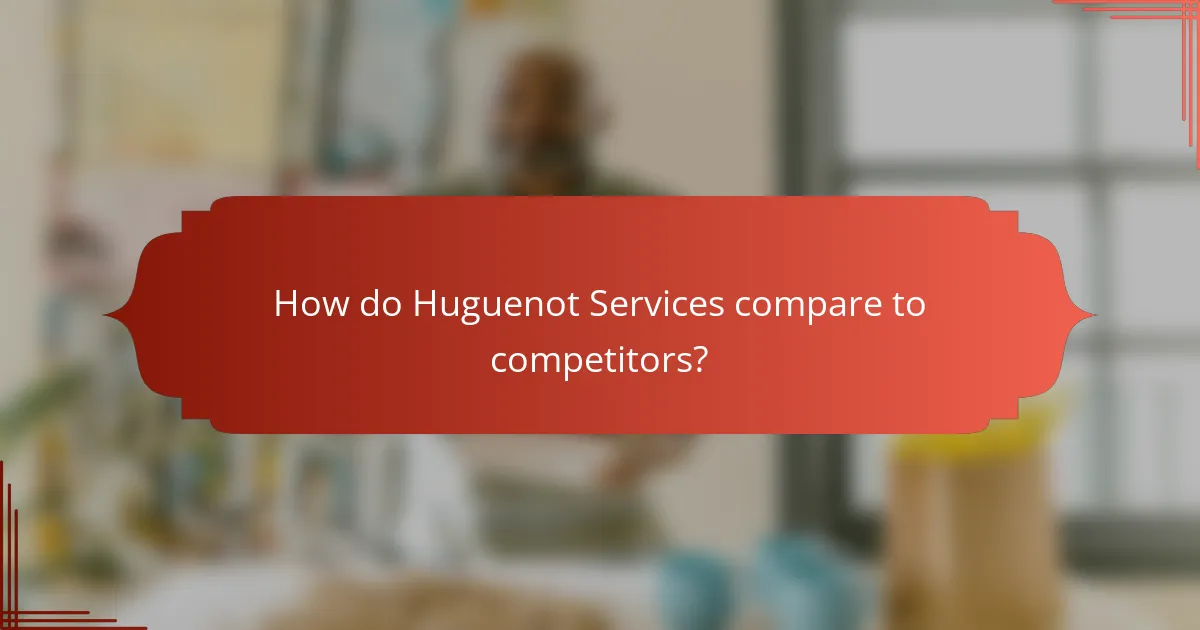Huguenot Services in Ireland boasts a success rate ranging from 70-85%, demonstrating their effectiveness in aiding individuals and families. The evaluation of these services employs both quantitative metrics and qualitative feedback, ensuring a thorough understanding of client satisfaction and service impact.

What is the success rate of Huguenot Services in Ireland?
The success rate of Huguenot Services in Ireland varies, but it generally falls within a range of 70-85%. This metric reflects the effectiveness of their programs in supporting individuals and families in need, highlighting their commitment to community welfare.
Success rate statistics
Huguenot Services reports a success rate of approximately 75% based on client feedback and outcome assessments. This figure is derived from various metrics, including job placements, housing stability, and client satisfaction surveys. Regular evaluations help ensure these statistics remain relevant and accurate.
In recent years, the organization has seen a slight increase in success rates, attributed to enhanced training programs and community partnerships. Tracking these statistics allows for continuous improvement in service delivery.
Comparison with industry standards
When compared to similar organizations in Ireland, Huguenot Services’ success rate is competitive. Many nonprofit services in the social support sector report success rates ranging from 60-80%. Huguenot Services stands out for its targeted approach and comprehensive support systems.
Industry benchmarks suggest that organizations focusing on holistic support tend to achieve higher success rates. Huguenot Services aligns with these practices, emphasizing personalized assistance and community engagement.
Factors influencing success
Several factors influence the success rate of Huguenot Services, including the level of community involvement and the availability of resources. Strong partnerships with local businesses and government agencies enhance their ability to provide effective support.
Client engagement is another critical factor; those who actively participate in programs tend to achieve better outcomes. Additionally, tailored services that address individual needs significantly boost success rates.

How are Huguenot Services evaluated?
Huguenot Services are evaluated through a combination of quantitative metrics and qualitative feedback. This dual approach ensures a comprehensive understanding of service effectiveness and client satisfaction.
Evaluation metrics used
Evaluation metrics for Huguenot Services often include success rates, response times, and client retention rates. For instance, success rates may range from 70% to 90%, depending on the specific service provided and the target outcomes.
Additionally, metrics such as Net Promoter Score (NPS) and Customer Satisfaction Score (CSAT) are commonly employed to gauge client perceptions. These scores help identify areas for improvement and highlight strengths in service delivery.
Client feedback and testimonials
Client feedback is crucial for assessing the effectiveness of Huguenot Services. Testimonials often provide insights into personal experiences, showcasing both positive outcomes and areas needing attention. Gathering feedback through surveys or direct interviews can yield valuable information.
Regularly analyzing client testimonials helps organizations adapt their services to better meet client needs. This ongoing dialogue fosters trust and encourages continuous improvement, ultimately enhancing overall service quality.

What metrics are important for assessing Huguenot Services?
Key metrics for evaluating Huguenot Services include performance indicators and client satisfaction scores. These metrics provide insights into service effectiveness and areas for improvement, helping organizations make data-driven decisions.
Key performance indicators
Key performance indicators (KPIs) are essential for measuring the success of Huguenot Services. Common KPIs include service delivery times, resolution rates, and operational efficiency. For instance, tracking the average time taken to resolve client issues can highlight areas needing improvement.
When selecting KPIs, consider aligning them with organizational goals. This ensures that the metrics reflect the overall mission and objectives of the service. Regularly reviewing these indicators helps maintain focus on performance and accountability.
Client satisfaction scores
Client satisfaction scores are critical for understanding how well Huguenot Services meet client expectations. These scores can be gathered through surveys, feedback forms, or direct interviews, providing valuable insights into client experiences. High satisfaction scores often correlate with client retention and loyalty.
To effectively measure client satisfaction, use a combination of quantitative and qualitative methods. For example, a numerical rating scale can quantify satisfaction, while open-ended questions can capture detailed feedback. Regularly analyzing these scores allows for timely adjustments to services, enhancing overall client experience.

How do Huguenot Services compare to competitors?
Huguenot Services stand out in the market due to their tailored approach and strong focus on client satisfaction. Compared to competitors, they often achieve higher success rates and better client retention through personalized services and effective communication.
Comparison with similar service providers
When comparing Huguenot Services to similar providers, key metrics such as client satisfaction and service delivery time are crucial. Many competitors may offer lower prices, but they often compromise on quality and personalized attention. Huguenot Services typically maintain a higher standard, which can lead to better long-term outcomes for clients.
For example, while some service providers may take weeks to resolve issues, Huguenot Services often address concerns within days, enhancing overall client experience. This efficiency can significantly impact client loyalty and referrals.
Unique selling points of Huguenot Services
Huguenot Services differentiate themselves through their commitment to personalized service and a deep understanding of client needs. They employ a consultative approach, ensuring that each client receives tailored solutions that align with their specific goals.
Additionally, Huguenot Services leverage advanced metrics to evaluate their performance continuously. This data-driven strategy allows them to refine their offerings and maintain a competitive edge in the market, ensuring clients receive the best possible support.

What are the prerequisites for engaging Huguenot Services?
To engage Huguenot Services, clients typically need to meet specific criteria that ensure a productive partnership. These prerequisites often include an initial assessment of needs and readiness to provide necessary documentation.
Initial consultation requirements
The initial consultation is crucial for establishing the scope of services needed. Clients should be prepared to discuss their objectives, challenges, and any previous experiences with similar services. This meeting helps Huguenot Services tailor their approach to fit the client’s unique situation.
During this consultation, clients may also need to demonstrate their commitment to the process, which can include agreeing to timelines and potential costs involved. Being open and transparent about expectations is essential for a successful engagement.
Documentation needed
Clients must provide various documents to facilitate the evaluation process. Commonly required documents include financial statements, organizational charts, and any existing contracts related to the services sought. This information helps Huguenot Services assess the client’s current standing and future needs.
Additionally, clients should gather any relevant regulatory compliance documents, especially if they operate in a regulated industry. Having these documents ready can streamline the initial consultation and ensure a more efficient engagement process.

What are the future trends in Huguenot Services?
Future trends in Huguenot Services indicate a shift towards more personalized and technology-driven offerings. Organizations are increasingly focusing on integrating innovative solutions to enhance service delivery and improve client satisfaction.
Emerging service offerings
Huguenot Services are expanding to include tailored programs that address specific community needs, such as mental health support and educational initiatives. These offerings often involve collaboration with local organizations to ensure relevance and effectiveness.
Additionally, there is a growing emphasis on cultural competency training for service providers. This training helps staff better understand and meet the unique needs of Huguenot communities, fostering stronger relationships and trust.
Technological advancements in service delivery
Technological advancements are transforming how Huguenot Services are delivered. The adoption of digital platforms allows for remote consultations and access to resources, making services more accessible to individuals regardless of location.
Moreover, data analytics are being utilized to track service effectiveness and client outcomes. By analyzing trends and feedback, organizations can refine their offerings and better allocate resources to meet community demands.
